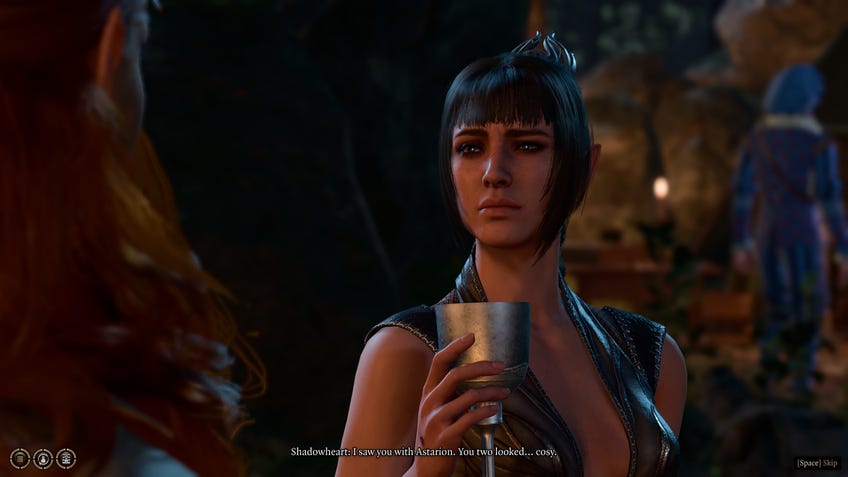“I spend most of my days wandering around talking to myself”: Baldur’s Gate 3, Witcher 3 and Horizon: Forbidden West actors on how to be a better roleplayer
And why collaboration is the most important thing.
Being good at acting doesn’t mean you’re good at roleplaying. “I’m a terrible roleplayer,” admits Doug Cockle, the actor most well-known for his role as Geralt of Rivia in the Witcher series of video games. “I’m not a fantastic improviser.”
Though the skills required to professionally act have a lot in common with those used to roleplay – expressions, body language and vocal acting, for example – just because you’re accomplished at one, doesn’t mean you’ll smash the other.
Nevertheless, we’ve seen what professional talent can do with tabletop roleplaying. Thanks to shows like Critical Role and Dimension 20, actors have been able to show off their skills through roleplaying, leading to many players dreaming of being able to achieve similar high standards in their home games. The reality is that most of these actors have had many years and opportunities to hone their talents, as well as budgets for things like professional sets, costumes and makeup. Players won’t be able to achieve the same level of quality as the likes of Critical Role overnight, but they can apply some of their techniques in their tabletop RPG playthroughs and notice the difference.
It needs to sound like it’s coming from a real person.
“Good acting for me is when I think this is the first time a character has thought these thoughts or said these words,” says Amelia Tyler, who voices the narrator in the Dungeons & Dragons video game Baldur’s Gate 3. When it comes to Tyler’s career, there’s little room for improvisation, with many of her roles requiring her to read from subtitles that have already been implemented into a video game.
Regardless, she finds opportunities to imbue her own unique touches through the way she performs the words. “Most people trail off in the middle of sentences when a thought takes you in a different direction,” Tyler gives as an example. “I want to hear that thinking going on underneath the speech.”
Another example she provides is the way a person breathes whilst acting: “You can tell a lot from breathing. A lot of people are scared to bring that into acting, but that’s what makes it feel alive to me.” For Tyler, giving a character’s words life means communicating in a way that feels genuine. “It needs to sound like it’s coming from a real person.”
When it comes to Jay Britton – an actor who has performed in video games such as Horizon: Forbidden West and Divinity: Original Sin 2 – good acting is all about understanding your character. “People get obsessed with things like what a character looks or sounds like, as opposed to understanding them at a core level,” says Britton. “Who is this character and what are the core pillars of their personality?”
The more you can set up for your character before you start playing, the more fun you’re going to have becoming them.
Cockle says something similar, emphasising the importance of knowing what a character wants: “One of the things that actors learn early on is how to identify a character’s objective.”
Though tabletop RPGs like D&D place a lot of importance on rolling stats and choosing your class when creating your character, all three actors highlight the benefits of putting personality and backstory first. “I did a BSC in experimental psychology – so that’s how I go into my character formation,” Tyler explains. “I look at what makes my character tick.” Being sure of the motivations of your character - understanding why they do what they do - will enable you to more naturally roleplay as them. Cockle doubles down on this advice: “The more you can set up for your character before you start playing, the more fun you’re going to have becoming them.”
Once players have an idea of who their character is, they can attempt to find ways to express their personality and background. Cockle suggests wearing something you think your character would wear, which he says can help get you in the same headspace. Alternatively, the Witcher actor advises switching the way you address yourself when you’re roleplaying: “Changing your character from third- to first-person can help you get into that role.”

Another option is to apply a certain voice or accent when speaking as your character. “Always figure out who the character is, then figute out the voice characteristics,” Britton says. The actor describes his process for devising voices for his TRPG character, picking out traits – such as their age, their personality and their life experiences – and using them to shape a sound.
“Make sure it’s a voice you can sustain for 30 sessions-plus of roleplaying and try not to get caught up in impersonating another character. A lot of people trying to do a Scottish accent just fall into the trap of sounding like Mrs Doubtfire.”
Once players have chosen their voice, Britton recommends that players find opportunities to practise performing it – whether on their own or with other people. “I spend most of my days wandering around the house talking to myself,” he admits. “One of the simplest things you can do is narrate yourself in third-person. If you really want to put yourself out of your comfort zone, try to send a letter at the post office in that voice.”
Roleplay is very much a collaborative effort, nobody is the main character.
In contrast, Tyler often doesn’t bother with putting on voices; “90% of my work is in my natural voice.” The Baldur's Gate actor believes that varying the tone of your voice, making it sound like there’s intention and feeling behind it, is just as important, if not more, than an accent. “You can change up the rhythm, pacing and pitch of your voice rather than doing an accent.”
Performing certain exercises can get players closer to nailing their vocal delivery, according to Cockle. The actor explains that “simple vocal warm-ups – like tongue trills and tongue stretches – warms up the insides of your mouth”. Even getting up and physically moving about can help with acting performance: “If you can warm up a little bit, get the blood pumping, that'll help your imagination and expression.”
What’s more important than any character brainstorming, accent or vocal work, is collaboration. “Roleplay is very much a collaborative effort, nobody is the main character,” says Britton. “Go into roleplaying with the attitude of a team sport – knowing when to talk and when to let a scene sit is key.” Tyler echoes this sentiment: “Being attuned to how players are feeling is more important than the rest.”
Outside of the actual roleplaying and acting itself, being aware of how your character choices, actions and words may affect the other players at the table is crucial to being a good player. Doing things like using safety tools and creating an environment in which players feel able to share their feelings can make all the difference. “It is important that you’re challenging yourself as a player when it comes to your character. There are opportunities to learn from experimenting by embodying different people,” says Britton, “but is there a way you can do that in a way that’s more sensitive to the table you’re playing with and humans as a whole? You need to make sure that the group is comfortable with what’s going on at the table.”
Understanding what works in which context is the most crucial part of applying acting techniques when roleplaying. “Good acting is when I see a character living their moment, good acting is different depending on the moment,” says Cockle. Devising and performing a character that will come across to players in a clear way, one they can connect with and emotionally root for – whilst being comfortable with them – is the best way you can show off your acting skills.
Otherwise, as Cockle says, “allow your imagination to run amok - that’s the whole purpose of these things”.
/>

